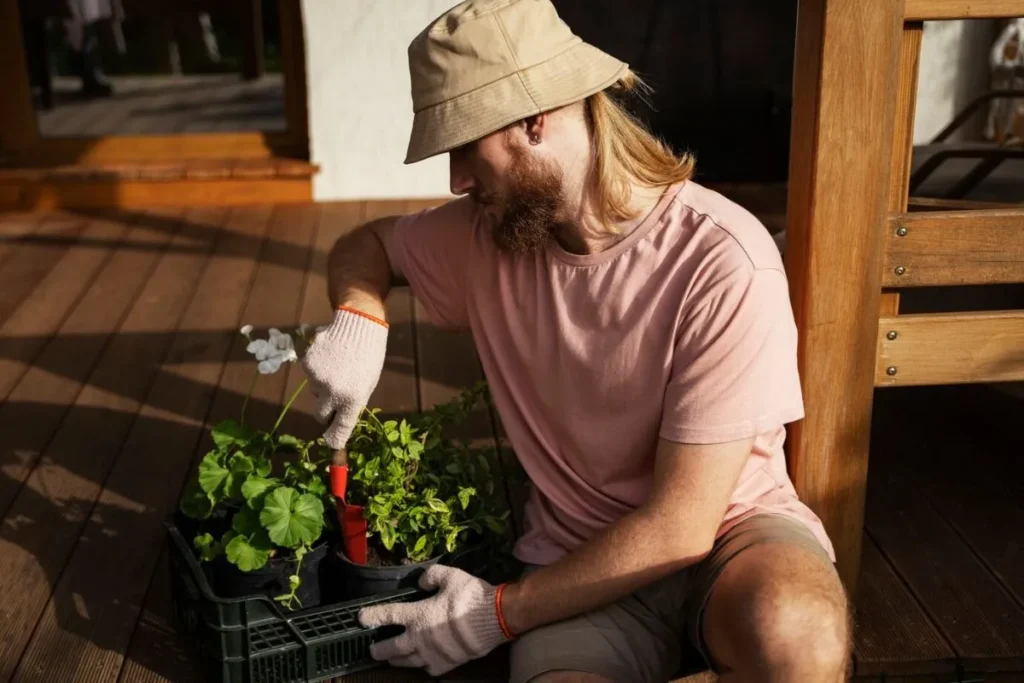Sustainable Permaculture Practices for Urban Gardens are transforming how we think about cities. They integrate ecology with urban living, regenerating both community and environment.
Urban gardens offer multiple benefits. They enhance local food production, transform green spaces, and boost community connections.
Incorporating permaculture into urban gardens ensures sustainability. This approach drives ecological transformation, fostering long-term environmental health.
Understanding Sustainable Permaculture Practices for Urban Gardens
The core of Sustainable Permaculture Practices for Urban Gardens lies in mimicking natural ecosystems. This ensures that urban environments become regenerative.
Permaculture integrates various sustainable methods. From water conservation to renewable energy, it focuses on ecological balance.
Urban gardens using permaculture move beyond aesthetics. They become functional ecosystems, addressing food production and biodiversity.
Principles of Permaculture
Permaculture is grounded in principles that guide sustainable practices. These principles ensure that every aspect of the urban garden works in harmony.
Key principles include:
- Observe and Interact: Understanding the environment and working within its limits.
- Catch and Store Energy: Maximizing the use of renewable resources.
- Produce No Waste: Creating closed-loop systems to reduce waste.
These principles ensure that urban gardens are not only sustainable but also self-sufficient.
Designing Urban Gardens
Effective design is crucial for Sustainable Permaculture Practices for Urban Gardens. It involves strategic planning to optimize space and resources.
The design process includes:
- Site Analysis: Assessing sunlight, wind, and soil conditions.
- Zones and Sectors: Dividing the garden into zones based on their function and frequency of use.
- Integration of Systems: Combining various elements such as water management, plant placement, and soil fertility.
By following these steps, urban gardens can thrive, providing substantial benefits.
Methods and Applications in Urban Gardens
Various methods can be applied to create successful urban gardens. These methods focus on sustainability and community benefits.
Here are some innovative approaches to integrate into your urban garden:
Water Conservation Techniques
Water is a precious resource in urban environments. Implementing water conservation techniques is vital for sustainable urban gardens.
Some effective methods include:
- Rainwater Harvesting: Collecting and storing rainwater for garden use.
- Drip Irrigation: Efficiently delivering water directly to plant roots.
- Mulching: Reducing evaporation and retaining soil moisture.
These methods not only save water but also ensure plants receive the hydration they need.
Vertical Gardening
Space is often a constraint in urban settings. Vertical gardening maximizes the use of available space.
This technique involves growing plants upward using structures like trellises or wall mounts. Benefits include:
- Increased Plant Density: More plants in less space.
- Improved Air Circulation: Reducing plant diseases.
- Enhanced Aesthetics: Vertical gardens can beautify urban areas.
Vertical gardening makes it possible to grow a variety of crops even in small urban areas.
Companion Planting
Companion planting involves growing certain plants together to enhance growth and productivity. This method is highly effective in urban gardens.
Examples of beneficial pairings include:
- Tomatoes and Basil: Basil repels pests and enhances tomato flavor.
- Carrots and Onions: Onions deter carrot flies.
- Beans and Corn: Beans fix nitrogen, benefiting corn growth.
Using companion planting leads to healthier plants and higher yields.
Community and Ecological Benefits
Sustainable Permaculture Practices for Urban Gardens extend beyond individual benefits. They play a crucial role in community building and ecological improvement.
These practices help create green spaces, enhancing urban living environments. They also foster community engagement and education.
Creating Green Spaces
Urban gardens transform barren city landscapes into lush green spaces. These areas provide numerous ecological benefits.
Green spaces improve air quality, reduce urban heat islands, and support biodiversity. They also offer recreational opportunities for residents.
Such transformations make cities more livable and sustainable.
Building Community
Urban gardens serve as community hubs. They bring people together and foster social connections.
Community gardens often involve collaborative efforts. Neighbors work together, sharing knowledge and resources.
These gardens also provide educational opportunities. Workshops and events can teach sustainable practices to residents.
Enhancing Food Security
Food security is a pressing issue in urban areas. Urban gardens contribute to local food production, reducing reliance on external sources.
Growing food locally ensures access to fresh, nutritious produce. This is particularly important in food deserts where fresh food is scarce.
Urban gardens can thus play a significant role in improving community health and wellbeing.
Sustainable Permaculture Practices for Urban Gardens in Action
The application of sustainable permaculture practices can be seen in various successful urban gardens across the globe.
These gardens serve as models for how urban areas can be transformed through permaculture principles.
Case Studies
Several cities have implemented successful urban gardens. These case studies provide valuable insights into best practices.
In New York, the Battery Urban Farm uses permaculture to cultivate crops. This farm not only produces food but also educates the public.
In Melbourne, CERES Community Environment Park showcases a wide range of sustainable practices. It serves as a living classroom for urban permaculture.
Lessons Learned
These case studies highlight key lessons for successful implementation. They emphasize the importance of community involvement and adaptability.
Other lessons include:
- Starting Small: Begin with manageable projects and expand.
- Continuous Learning: Stay updated with new techniques and approaches.
- Collaboration: Engage stakeholders and build partnerships.
Applying these lessons can lead to thriving urban gardens.
Future Prospects
The future of urban gardening looks promising. As cities continue to grow, so does the importance of sustainable practices.
Technological advancements and increased awareness drive innovation. Urban gardens are becoming more sophisticated and efficient.
The adoption of permaculture in urban settings is set to expand. This will further enhance urban environments and community well-being.
The Path Ahead
Sustainable Permaculture Practices for Urban Gardens hold significant potential. They can transform urban areas into thriving ecosystems.
Embracing these practices leads to numerous benefits. Improved food security, community engagement, and environmental health are just a few.
As we move forward, let us continue to innovate and apply sustainable permaculture in our urban gardens.
To stay updated on the latest developments, join our community newsletter. Share your own urban gardening experiences and learn from others.
Frequently Asked Questions
What is permaculture?
Permaculture is a design philosophy that aims to create sustainable and self-sufficient ecosystems. It is based on principles that mimic natural systems.
How can I start an urban garden?
Begin by analyzing your site, planning your garden layout, and choosing appropriate plants. Consider water conservation and soil health.
What are the benefits of urban gardening?
Urban gardening improves food security, enhances green spaces, and fosters community engagement. It also supports biodiversity and reduces urban heat.
Can permaculture be applied in small spaces?
Yes, permaculture can be adapted to any space. Techniques like vertical gardening and container gardening are ideal for small urban areas.
Where can I learn more about sustainable gardening practices?
Join local gardening groups, attend workshops, and follow online resources. Books and courses on permaculture also provide valuable information.



